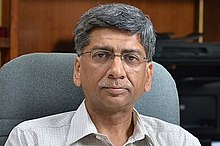Anurag Kumar
Anurag Kumar was the Director of the Indian Institute of Science at Bangalore, India from 2014-2020. He is a professor at the Department of Electrical Communication Engineering, and has served as the Chairperson of the Electrical Sciences Division at the Indian Institute of Science, before being appointed as the Director in 2014.
Anurag Kumar | |
|---|---|
 | |
| Born | July 13, 1955 |
| Citizenship | Indian |
| Alma mater | Indian Institute of Technology Kanpur (BTech) Cornell University (PhD) |
| Occupation | Professor, Department of Electrical Communication Engineering, Indian Institute of Science |
| Awards | Co-winner of the CDAC-ACCS foundation award |
Education and career
Anurag Kumar obtained his B.Tech. degree in Electrical Engineering from the Indian Institute of Technology at Kanpur in 1977, and was awarded the President of India’s Gold Medal. He then obtained the PhD degree from Cornell University (1981), where he worked under the guidance of Prof. T.L. Fine. He was a Member of Technical Staff at AT&T Bell Labs, Holmdel, N.J., for over 6 years. During this period he worked on the performance analysis of computer systems, communication networks, and manufacturing systems. [1]
His current research areas of interest include communication networks, cyber physical systems, distributed Systems: stochastic modelling, analysis, inference, optimisation, and control problems arising in such systems. [2]
Since 1988 he has been with the Indian Institute of Science (IISc), Bangalore, in the Department of Electrical Communication Engineering (ECE). From 2000 to 2004 he was the Associate Chair of the ECE Department, from 2004 to 2007 he was the Chair of the ECE Department, and from 2007 to 2014 he was the Chair of Electrical Sciences Division. From 1989 to 2003, he was also the Coordinator at IISc of the nationwide Education and Research Network (ERNET) Project, which established the first country-wide packet communication network in India.[3]
He has served as an Area Editor for IEEE Transactions on Networking, and for IEEE Communications Surveys and Tutorials.
Awards and recognition
Prof. Kumar received the Institute of Electronics and Telecommunications Engineers (IETE) CDIL Best Paper Award (1993). He is a recipient of the COMSWARE 2008 Conference Best Paper Award, and also the IISc Alumni Award for Excellence in Engineering Research (2008).On 26 October 2009, Anurag Kumar was announced as a co-winner of the CDAC-ACCS Foundation Award for 2009 by the Advanced Computing and Communications Society.[4]
He has been an elected Fellow of the Indian National Academy of Engineering since 1999[5] and an elected Fellow of the Indian National Science Academy since 2006.[6] He is also a Fellow of Indian Academy of Sciences from 2010. As of 1 January 2006, Anurag Kumar is an elected Fellow of the Institute of Electrical and Electronics Engineers.[7] He has been awarded the DST J.C. Bose National Fellowship for the period 2011-2021.[8]
References
- "Anurag Kumar". Retrieved 3 August 2020.
- "Current Research Areas – Anurag Kumar". Retrieved 3 August 2020.
- "History | Official Website of ERNET India Education & Research Network". ernet.in. Retrieved 3 August 2020.
- ACCS announces CDAC-ACCS Foundation Award winners 2009, Advanced Computing and Communications Society press release. Accessed 27 November 2009
- Fellows profile. Archived 19 March 2008 at the Wayback Machine INAE. Accessed 12 May 2008.
- "Indian Fellow-Anurag Kumar". Indian National Science Academy. 8 November 2017. Retrieved 8 November 2017.. Accessed 14 May 2008
- IEEE Fellows Elected as of 1 January 2006. IEEE. Accessed 12 May 2008.
- DST J.C. Bose National Fellowship for the period 2011-2021 Accessed 16 June 2020.